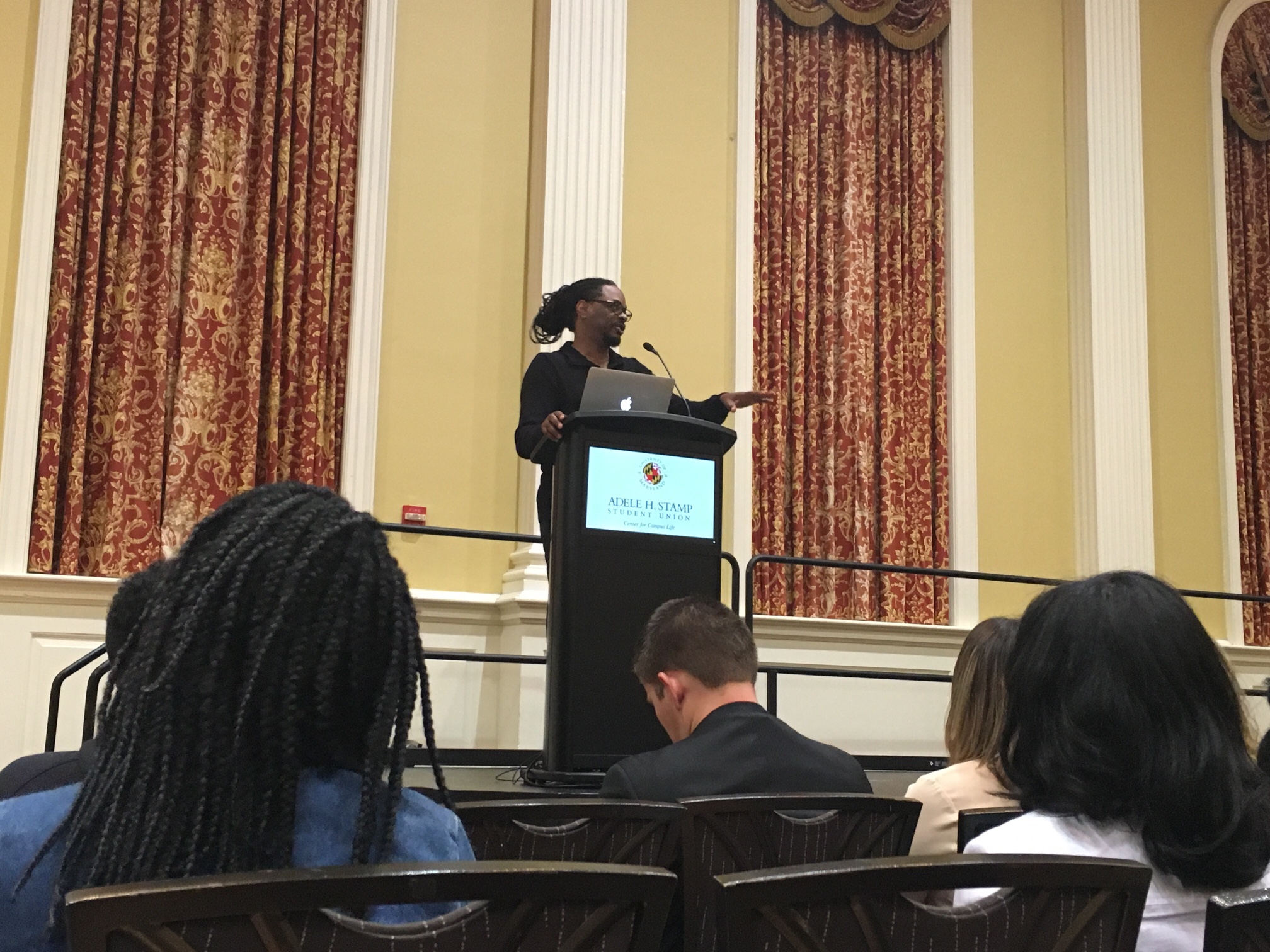Author Lawrence Ross’ opening line for his “Blackballed: A Lecture on Campus Racism” talk repeated a racist chant from two University of Oklahoma Sigma Alpha Epsilon fraternity members that placed a spotlight on campus racism more than a year ago when it circulated social media.
“How many of you have heard that song before?” asked Ross, a University of California, Berkeley alumnus. “One person put a camera phone in front of [the two of] them. … They sang directly into the camera. They didn’t realize that the person actually filming the video was actually upset.”
The University of Maryland’s Department of Fraternity & Sorority Life co-hosted the lecture as part of the university’s Maryland Dialogues series Monday night in Stamp Student Union’s Grand Ballroom to talk about campus racism and how it affects university students. The event attracted about 100 students and faculty.
Ross kicked off the discussion talking about the difference between whiteness and blackness and how “racism consists of whiteness being seen as good, tied to positive traits, and blackness being seen as bad, tied with negative traits.”
He also touched on cases such as the 16th Street Baptist church bombing in Birmingham, Alabama; the doll test in which young black girls were asked to choose between a white doll and black doll to see which one was better, and the Waka Flocka Flame theory, coined by Joe Scarborough of Morning Joe.
“Waka was supposed to appear at the University of Oklahoma and when he saw the actual reporting of the racist song, Waka said he didn’t want to appear there,” Ross said. “Joe [Scarborough] said that it can’t be the students’ fault since they hear the N-word repeated in Waka’s songs.”
While doing research for his book, Blackballed: The Black and White Politics of Race on America’s Campuses, Ross noted that minority students at different schools such as Texas A&M University and Oklahoma would come up to him and tell him about their negative experiences on those campuses, admitting to him that “they felt isolated and felt like they don’t have a place on campus.”
This university has not been immune to racist rhetoric. The last year on this university’s campus “has really shone a light on racism and Greek life,” said Kumea Shorter-Gooden, the university’s chief diversity officer.
Within the past year, there have been two incidents here involving fraternities and racial slurs, as well as drugging allegations, Ross said. The first incident was in early February, when a racist, sexist Tau Epsilon Phi Listserv thread from Jan. 19, 2015 began circulating on Twitter and elicited student backlash. The second incident that same month involved an email from the Delta Tau Delta president to the university’s Greek life community, dispelling a claim that a woman was drugged at a Feb. 13 fraternity party.
Racist rhetoric on college campuses often culminates in student protests, Ross said, stating that, “Because of all this hate, black students have had to protest to make their voices be heard in the place where they go to school.”
When racist actions take place on college campuses, he said, students should not put up with it. Rather, they should stand against it.
“Everything is simple: Kids need to get together and stop doing racist things,” Ross said. “You have to be the one standing up to racism and not cheering it on. There is a difference between being nonracist and anti-racist.”
University President Wallace Loh praised the event and the participation of Greek life governing bodies who co-sponsored it.
“For Greek life to be involved, especially since several incidents in the past have involved Greek organizations, I think it sends a very positive message about their engagement,” he said. “They buy into this issue and are working to learn more and to fix it.”
Junior Alesia Robinson, a public health science and Spanish major, said Ross was a great speaker who spoke very well on issues that are happening on college campuses.
However, she was disappointed with the audience, she said.
“I know that this is a Greek week event and that you get points for coming, but at the end, most of the people just left and that really took away from the discussion that could have taken place,” Robinson said.
Senior staff writer Darcy Costello contributed to this report.



